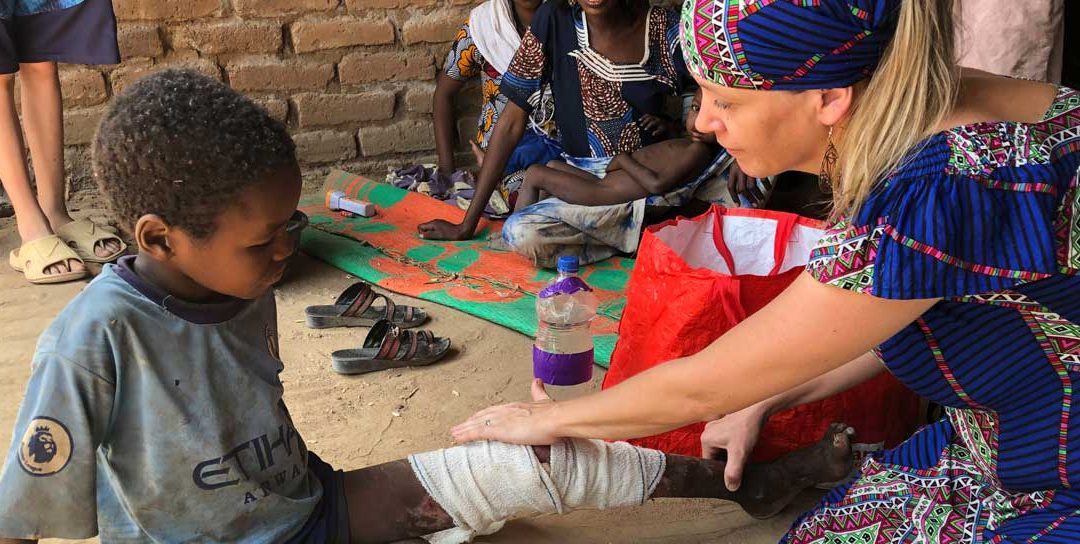We hear in the Great Commission a call to go. What does it mean to go? Before Jesus ascends into heaven, he gives this charge to his disciples, to his followers. Why should they go? Because he wants to use his followers to bring all people into relationship with him. He wants all people to be released from sin and eternal death, to live in the freedom of Jesus Christ.
When I realized that there were people in Chad who had no access to God’s Word, who didn’t know Jesus as their Savior, then going to Chad to give them his Word was an easy decision.
Before arriving in Chad, our family spent a year in the French Alps to learn the French language. The Alps was one of the most beautiful places I have ever lived. We had mountain views from our windows and lived among cathedrals and castles. Then we moved from the picturesque Alps, surrounded by such magnificent beauty, to a starkly different place—to Chad, where my cobblestone walks were turned into dry dusty roads.
As I walked in my neighborhood in Chad, I was surrounded by animals grazing on garbage and kids collecting it to fuel the fire their mothers would cook over. It was difficult living among such harsh realities of this world’s poverty. I longed for the beauty I had gotten to know while living in France during language school. I was longing for the comforts I had known living in Western nations my whole life. Life got hard. It was easy to stay inside my house, and not go outside. I had gone, but did I really go?
In living among the brokenness of the world I was stripped of all the ways I thought I could give them the gospel. The people in my village are unable to read so giving them the written Word like I could in the States wouldn’t work here. My ability with their language was at the level of a preschooler, so it was difficult to help them understand the Word. I desired to relieve the pain of their suffering.
Humja was the first malnourished baby I met in our village. A group of children led me to his home, where I met his mother. She knew that something was wrong, that he was too thin. I could see the love and care she had for him in her eyes. I began to make bottles for him and feed him two times a day hoping that I could give his body what it needed to grow and be healthy, each time praying, “The Lord bless you and keep you; the Lord make his face shine upon you and be gracious to you; the Lord turn his face toward you and give you peace; in the name of the Father and of the Son and of the Holy Spirit.” It was tiring making bottles daily and one day I was exhausted and didn’t bring him one. The next day I learned that he had died during the night. The one day I didn’t bring a bottle. You see, it’s easy to put our hope in our deeds, isn’t it? It’s easy to put our hope in tangible things. I tried hard, really hard, but I wasn’t able to take away the ugliness and the brokenness, and God didn’t fix it right then either.
I desired to see God’s beauty in this place. I prayed, asking him to show it to me.
I began keeping a list of things I was thankful for, naming them, numbering them. Each day I would get up with my coffee, think about what I was thankful for, and then spend time in God’s Word. God began to show me his beauty—sometimes in his creation, the birds, the banana leaves; sometimes in simple pleasures like coffee or bacon. As I spent more time with the people in their suffering, God showed me beauty in his people, in relationship. The feeding of Humja led to other children coming, and they were able to receive nourishment to make them strong enough to then transition to food. This led to so many relationships.
God taught me what going means. When God calls us to go, it is not just a one-time event, it is a daily going, a daily wading into the muck that is outside our door. When we live in nations where resources and help are so plentiful, I think we are able to hide this muck we walk through every day more easily. We all long for eternal comfort, but in Chad there is no hiding the muck. The longer I live in Chad, the beauty of relationship grows. And the desire of God wanting relationship with his lost children becomes my desire too.
I know of the beauty of Jesus Christ because I know how he takes my brokenness and makes it whole, and I long for others to know it too. I realize now that he wanted me to live in my brokenness, to embrace it. He works in ways we cannot see. We continue to give what we can even when we don’t feel like it’s making a difference in this world. You offer what you have and pray that God will use the brokenness, the tears, your presence, cold water, his Word, whatever you have to offer. This is what sustains me, that his presence in me is enough. I can simply trust in him and do not have to figure out what his plan is. It is a daily offering of giving what I can, while going each and every day, no matter how broken things seem to be. To God be the glory. Amen.
Sonja and her husband David serve the Church of the Lutheran Brethren as missionaries in Chad, Africa.

